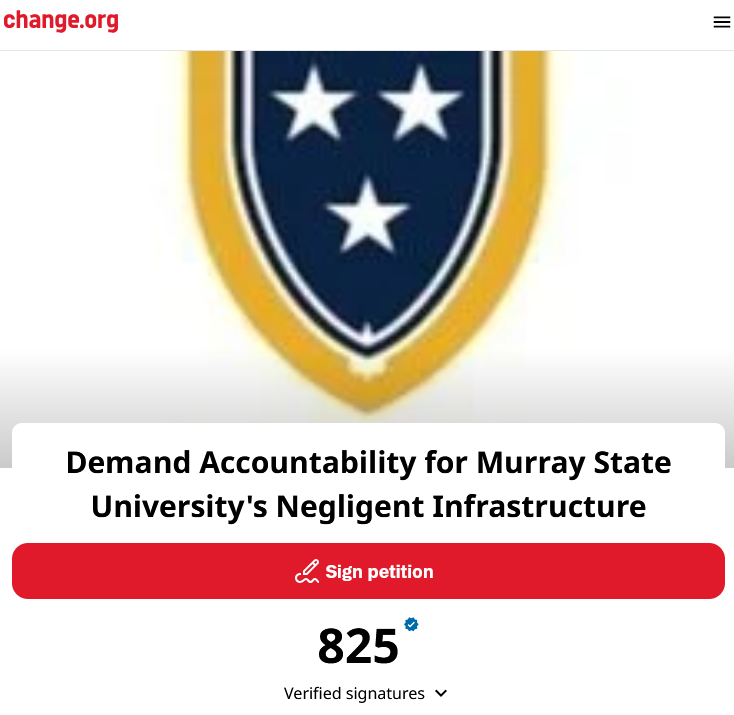The petition to “Demand Accountability for Murray State University’s Negligent Infrastructure” has amassed over 800 signatures since it was created on Sunday, Feb. 16.
The petition’s creator, currently identifying as S H, updated the petition Monday night.
“This fight won’t just end with a petition, it is time to fight for our fellow students and all the residents and staff of RH White and Regents,” S H wrote. “The administration of Murray State has forgotten about their job to provide for the students… As of 10 p.m. on Feb. 17, Regents and White are being boarded up and students will only be able to retrieve any items needed from 10 a.m. to 4 p.m…. While the University has offered alternative housing options for the residents of Regents and White, many students didn’t receive their housing assignments until long after the 8 p.m. deadline to be out of their dorms on Feb. 16. As of Feb. 17, many students are paying for their own hotels or living in their cars while waiting for their temporary housing assignments.”
As the number of signers grows, comments reveal more perspectives from students affected by the recent power outage.
“I’m diabetic and my insulin has to be refrigerated,” wrote one signer, Paige. “I gave the school the benefit of the doubt for as long as I possibly could but I finally had to drive back home last night to keep the medication from going bad.”
According to the Food and Drug Administration (FDA), insulin should be stored in a refrigerator at 36°F to 46°F.
On Saturday, Feb. 15, the highest temperature was 55°F. On Sunday, Feb. 16, the lowest temperature was 27°F.
The FDA cautions that insulin loses some effectiveness when exposed to extreme temperatures. “This can result in loss of blood glucose control over time…,” according to the FDA website. “Do not use insulin that has been frozen… When properly stored insulin becomes available again, the insulin vials that have been exposed to these extreme conditions should be discarded and replaced as soon as possible.”
“If there was ANY communication from Murray that the outage would last so long, I would’ve packed up days ago and had a safe trip home,” signer Paige wrote. “I ended up driving four hours back through thunderstorms and flood zones last night because what else am I going to do with the insulin? Insurance doesn’t do replacements. Murray did not provide the information I needed to make the best decision about how to handle the situation this weekend.”
The Murray State News contacted the Murray State Office of Branding, Marketing and Communication on Feb. 16 to ask about “solutions for students with insulin or other medications that need to be refrigerated” and to see how the University had helped. The office did not address the concern in their Feb. 17 reply.
Paige is not the only student facing complications with her medication.
“I have asthma and need to take breathing treatments,” wrote signer Elijah.“So no power means no breathing treatments.”
According to the Asthma and Allergy Foundation of America (AAFA), one common treatment for asthma is a nebulizer machine, or “breathing machine,” which turns liquid asthma medicine into a mist. The medicine can then be breathed in through a mask or mouthpiece.
“Nebulizers may be easier to use than asthma inhalers for some people. Once the nebulizer is set up and ready to use, simply breathe in and out as normal,” according to the AAFA.
Most nebulizers need to be plugged into an electrical outlet to work.
Many RH White and Regent Hall residents shared their experience with their temporary evacuation and relocation.
“In the beginning, I tried to give the University the benefit of the doubt. They couldn’t exactly predict the lightning strike, after all,” wrote signer Chloe. “But through this whole ordeal, Murray State has shown time and time again their lack of communication skills, and their disregard for their students. They gave hardly any warning with temporary housing accommodations, and they made many mistakes with it. They put girls in male rooms, put people in rooms already holding two residents, and put people in places previously deemed not up to living standards. On top of that, residents were only given one day off classes to move, and expect us to return to our studies on Tuesday. This is completely unacceptable, as many people are still trying to figure things (out) during these tumultuous times. Murray State needs to do better, for their students and their community.”
Some students noted that it was only the more affordable housing options being impacted long-term, which disproportionately impacts lower income students.
“Very sick and tired of MSU always having (a) ‘lighting strike’ and it only affecting the lower income students (in) the cheaper housing,” wrote signer Izabella. “Let’s be truthful about what’s really going on Murray State and take accountability for your actions and not always blame it on the weather.”
“The fact that we are paying for housing and this is happening is an outrage. And it is only happening to lower income housing,” wrote signer Samantha. “This is more than unfair, people are here to get an education, and should not have to deal with this. I did not know that I would be dealing with this simply because I can only afford the cheaper housing option.”
Some students are calling for refunds from the University for the inconvenience of relocating.
“Murray State needs to do better. They have failed to do the bare minimum time and time again. It’s time for some accountability,” wrote signer Anna.
Other students have questioned where the University’s priorities lie during infrastructure issues.
“I had work this weekend and I was not able to shower, wash my clothes (which were soaked from all of the rain), or flush my toilet,” wrote signer Comet. “The fact that they even cancelled classes Monday is shocking since that’s more than they did last time this happened, but the fact that their primary focus was the basketball game instead of our water and electricity in the dorms we pay thousands of dollars to live in is terrible.”
The Murray State News also contacted the Office of Branding, Marketing and Communication, asking them to address the “expressed frustrations with a lack of communication on the power outage and updates” and the perceived higher priority given to providing information on the basketball games. The department did not address this question in their response.
As western Kentucky residents prepare for the incoming winter storm, many students remain uncertain in what they should do and unconfident in the University’s ability to keep them safe.
“I’m scared of going back to Murray just to get snowed in (in) a dorm that doesn’t have power half of the time,” wrote signer Shayna.
Many petition comments share a thread of a desire for better communication and more accountability from the University.
“While I didn’t attend MSU when I was in college, I did work there for a year. As a former staffer, I can say this—they keep us in the dark for as long as possible, too,” wrote signer Cass. “There’s not just a lack of communication with students, but with staff as well. Murray has a long-standing, uncorrected issue with transparency and communication. I’m rooting for you all. Demand accountability!”
Murray State University is listed as one of the decision makers on the petition, but they have yet to leave a response for petition signers to see.
The petition can be found at https://www.change.org/p/demand-accountability-for-murray-state-university-s-negligent-infrastructure?source_location=petitions_browse&pt=AVBldGl0aW9uAKxKOx0AAAAAZ7Miy2DWuDE4NGYzNDYzZA%3D%3D.





























































































